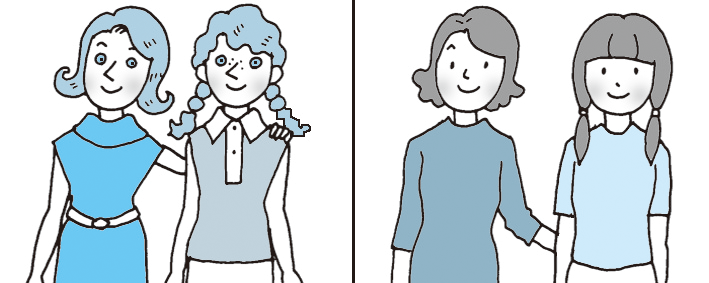CRITICAL READING TRAINING
Lesson 3 の本文は,2つのことを比較(Compare:共通点を見出す)・対照(Contrast:相違点を見出す)することで構成されています。比較・対照を表す語句(in contrast, meanwhile, onthe other hand など)に注意して,次の問題に取り組みましょう。
Read the passage below and answer the following questions.

Two Japanese mothers, who are acquaintances, are talking. The first mother says, “Your daughter is so brilliant! She did well on yesterday’s test. She must have worked hard.” The second mother replies, “Oh, no. She’s really very lazy. A ”
Meanwhile, two American women are talking about their daughters. Again one praises the other’s child, but this time the mother replies, “Thank you! My daughter does work very hard. B ”
For a Japanese listener, the American woman gives the impression that she is boasting. On the other hand, the first conversation may well cause confusion for an American listener. Is the girl really lazy? She may well have worked hard and it seems unfair that her mother insists that she didn’t.
In fact, both women’s conversations are alike. They both responded to a compliment appropriately. The difference is that in America it is proper to thank someone for a compliment and agree with them. In contrast, in Japan, C .
Comparing and Contrasting(比較・対照する問題)
(1) Fill in the blanks A and B in the passage using a and b below.
- Iʼm lucky to have such a clever girl.
- Iʼm sure she was just lucky.
A ( b ) B ( a )
(2) Read the third paragraph of the passage and fill in the blanks below.
日本人にとって,アメリカ人女性の受け答えは①( 自慢している〔鼻にかけている〕という印象を与える )。一方,アメリカ人にとって,日本人女性の受け答えは②( 不当に思え ),混乱を招く。
(3) Choose the most appropriate sentence that fills in the blank C of the passage.
- people generally compliment themselves and their family
- people generally donʼt compliment themselves but do compliment their own family
- people generally donʼt compliment themselves or anyone in their family

- acquaintance(s)
- lazy
- boast(ing)
- may well
- confusion
- insist(s)
- appropriately
- proper
